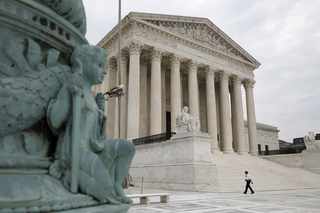The Supreme Court has now ruled on three legal challenges to the Affordable Care Act, and for opponents of the statute the third time was not a charm. In yesterday’s 7–2 ruling in California v. Texas, the Court held that the 18 states and two individuals claiming that the ACA’s individual mandate was unconstitutional lacked the standing to bring the case because they failed to demonstrate that they were injured by that now-unenforceable mandate. The case likely marks the end of the line for legal challenges to the health-care law.
In two earlier decisions, the Court saved the law with creative legal reasoning. In the first, 2012’s National Federation of Independent Business v. Sebelius, the Court characterized the penalty imposed on individuals who failed to purchase health insurance as a constitutionally permissible “tax” despite the fact that Congress had explicitly said the penalty was not a tax. The second, 2015’s King v. Burwell, interpreted an ACA provision that made premium subsidies available on health-insurance exchanges established by a “state” to include federally established exchanges. (The case was coordinated by the Competitive Enterprise Institute, where I am now a senior fellow.)
Read Full Article »




